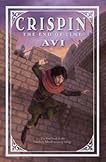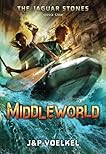Fiction Purple Hibiscus
by Chimamanda Ngozi Adichie
“Prose as lush as the Nigerian landscape that it powerfully evokes. . . . Adichie’s understanding of a young girl’s heart is so acute that her story ultimately rises above its setting and makes her little part of Nigeria seem as close and vivid as Eudora Welty’s Mississippi.” —The Boston Globe
READING LEVEL: 8th Grade
Peace
by Richard Bausch
“Richard Bausch’s Peace, set at the end of the Second World War in Italy, is a small masterpiece with the same emotional force and moral complexity as Conrad’s Heart of Darkness and Tolstoy's Hadji Murad.” —Colm Tóibín
READING LEVEL: 5th Grade
The Rope Walk
by Carrie Brown
A New York Public Library Book for the Teen Age
In The Rope Walk, Carrie Brown crafts a luminous story of a young girl’s coming of age during a crucial summer in New England.
“Beautifully written . . . . Captures the dignity and grace of a young woman coming into knowledge of herself and the world.” —Chicago Tribune
READING LEVEL: 6th Grade
The Guardians
by Ana Castillo
“A nuanced, vibrant look at the American experience through Mexican-American eyes.” —Kirkus Reviews
“Faulknerian . . . The rhythms of The Guardians are a pleasure to savor.” —San Francisco Chronicle
READING LEVEL: 10th Grade
The Power of One
by Bryce Courtenay
“Unabashedly uplifting . . . asserts forcefully what all of us would like to believe: that the individual, armed with the spirit of independence—‘the power of one’—can prevail.” —Cleveland Plain Dealer
READING LEVEL: 6th Grade
The Autobiography of Miss Jane Pittmanby Ernest J. Gaines
“Stunning. I know of no black novel about the South that exudes quite the same refreshing mix of wit and wrath, imagination and indignation, misery and poetry.” —Life
READING LEVEL: 6th Grade
The Curious Incident of the Dog in the Night-Time
by Mark Haddon
Narrated by a fifteen-year-old autistic savant obsessed with Sherlock Holmes, this dazzling novel weaves together an old-fashioned mystery, a contemporary coming-of-age story, and a fascinating excursion into a mind incapable of processing emotions.
READING LEVEL: 6th Grade
Unaccustomed Earth
by Jhumpa Lahiri
“Lahiri writes insightfully about childhood, while the romantic infatuations and obstacles to true love will captivate teens.”
—Donna Seaman, Booklist (starred)
READING LEVEL: 10th Grade
The Last Town on Earth
by Thomas Mullen
Set against the backdrop of one of the most virulent epidemics that America ever experienced—the 1918 flu epidemic—Thomas Mullen’s powerful, sweeping first novel is a tale of morality in a time of upheaval.
READING LEVEL: 9th Grade
When the Emperor Was Divine
by Julie Otsuka
Julie Otsuka’s commanding debut novel paints an unforgettable portrait of the Japanese internment camps. With crystalline intensity and precision, Otsuka uses a single family to evoke the deracination—both physical and emotional—of a generation of Japanese Americans.
READING LEVEL: 5th Grade
The Guernsey Literary and Potato Peel Pie Societyby Mary Ann Shaffer and Annie Barrows
January 1946: writer Juliet Ashton receives a letter from a stranger, a founding member of the Guernsey Literary and Potato Peel Pie Society. And so begins a remarkable tale of the island of Guernsey during the German occupation, and of a society as extraordinary as its name.
READING LEVEL: 6th Grade
The No. 1 Ladies' Detective Agencyby Alexander McCall Smith
Now an HBO Series
This first novel in Alexander McCall Smith’s widely acclaimed series tells the story of the delightfully cunning and enormously engaging Precious Ramotswe, who is drawn to her profession to “help people with problems in their lives.”
READING LEVEL: 6th Grade
The Good Thief
by Hannah Tinti
WINNER 2009 - Alex Award
“Every once in a while—if you are very lucky—you come upon a novel so marvelous and enchanting and rare that you wish everyone in the world would read it, as well. The Good Thief is just such a book—a beautifully composed work of magic.”
—Elizabeth Gilbert, author of Eat, Pray, Love
READING LEVEL: 7th Grade
Memoirs, Biography and Other NonfictionMy Lobotomy
by Howard Dully and Charles Fleming
“Dully’s tale is a heartbreakingly sad story of a life seriously, tragically interrupted. All Howard Dully wanted was to be normal. His entire life has been a search for normality. He did what he had to do to survive. This book is his legacy, and it is a powerful one.” —San Francisco Chronicle
READING LEVEL: 7th Grade
Into the Wildby Jon Krakauer
Jon Krakauer tells the haunting true story of Chris McCandless, who after graduating from college in 1991, walked deep into the wilderness of Alaska on a fatal odyssey.
READING LEVEL: 9th Grade
Shadow Divers
The True Adventure of Two Americans Who Risked Everything to Solve One of the Last Mysteries of World War II
by Robert Kurson
In the tradition of Jon Krakauer’s Into Thin Air and Sebastian Junger's The Perfect Storm comes a true tale of riveting adventure in which two weekend scuba divers risk everything to solve a great historical mystery—and make history themselves.
READING LEVEL: 9th Grade
Unbowed
by Wangari Maathai
In Unbowed, Nobel Prize winner Wangari Maathai recounts her extraordinary journey from her childhood in rural Kenya to the world stage. When Maathai founded the Green Belt Movement in 1977, she began a vital poor people’s environmental movement, focused on the empowerment of women, that soon spread across Africa
READING LEVEL: 10th Grade
The Good Good PigThe Extraordinary Life of Christopher Hogwood
by Sy Montgomery
“Hilarious, enchanting, and deeply affecting . . . Montgomery writes with extraordinary lucidity, candor, and grace about what this good, good pig taught her and others about life, love [and] happiness.” —Booklist
READING LEVEL: 7th Grade
Graphic NovelsThe Complete Persepolis
by Marjane Satrapi
“You've never seen anything like Persepolis—the intimacy of a memoir, the irresistibility of a comic book, and the political depth of the conflict between fundamentalism and democracy. Marjane Satrapi may have given us a new genre.”
—Gloria Steinem
READING LEVEL: 8th Grade
Pride of Baghdadby Brian K. Vaughan and Niko Henrichon
In the spring of 2003, a pride of lions escaped from the Baghdad Zoo during an American bombing raid. Lost and confused, the four lions roamed the decimated streets of Baghdad in a desperate struggle to survive. In documenting the plight of the lions, this graphic novel raises questions about the true meaning of freedom.
READING LEVEL: 9th Grade






























